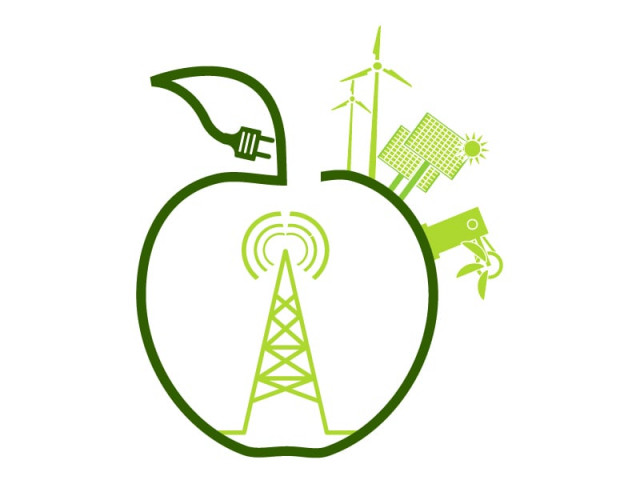Responsible power generation: Cellular industry’s shift towards green energy
Transition will be beneficial not just to telecoms but local communities as well.

The Telenor Group has adopted an ambitious target for reducing its internal carbon intensity of its operations by 40% by 2016, compared to the 2007 intensity level. DESIGN: ESSA MALIK
The global telecom industry has grown at an unprecedented rate over the past few years. As per a study conducted by GSMA Intelligence in 2012, there are 5.9 billion active mobile phone connections in the world. Pakistan has been at the fore-front of this growth with tele-density of about 70% and over 125 million active SIMs.
This growth has been supported through a robust telecom backbone comprising scores of towers. The surge in demand for telecom services has increased the sector’s energy requirements, making it one of the largest consumers of diesel and consequently, one of the biggest contributors to carbon emissions in the world, and also in Pakistan where frequent power failures as well as the lack of grid electricity in many rural areas has made it necessary to rely on generators.
With the rise of tele-density in rural areas this consumption of diesel is likely to increase.
However diesel is costly and has severe environmental consequences. Therefore, the telecom industry has started deploying green solutions to power its network operations.
State of telecom economy in Pakistan
The telecom sector is a million-dollar industry and one of the best performing sectors in Pakistan which saw a boom and massive investment in the early 2000s. In 2007 the sector grew by 80 percent while average growth rate in last four years has been more than 100 percent.
It has been a major contributor in the economic growth and GDP of Pakistan. Mobile telecommunication is the largest tax collecting and paying sector. The total contribution of the telecom sector to the national exchequer for financial year 2011-12 was Rs133 billion. Telecom operators are also making a significant contribution towards the overall economy by making 24% contribution ($4.9 billion) in the total Foreign Direct Investment made in the country by FY 2012 and a total of around 1.4 million direct and indirect jobs created by the Telecom Industry.

Energy challenges for cellular industry
Frequent power outage is one of the major crises in Pakistan which has caused great financial and operational losses to businesses. The situation is no different for the telecom sector. The only solution is to generate electricity through alternative sources in order to run base stations uninterruptedly.
The initial way was to deploy generators but their maintenance and fuel cost is a huge challenge besides being noisy and detrimental to the environment. It was therefore decided to deploy batteries along with generators that can be charged when electricity is available and provide backup when it isn’t. The generators kick in only when the batteries lose their charge and are unable to provide backup to the base stations. Apart from saving costs, this initiative also reduces CO2 emission.
Leading towards green energy transition
While a the entire telecom industry is focusing on this shift, the Telenor Group has adopted an ambitious target for reducing its internal carbon intensity of its operations by 40% by 2016, compared to the 2007 intensity level. The agreed emissions reductions will be achieved through investments in network updates, renewable energy etc. Telenor Pakistan already has 48 BTS sites running on Solar-Genset hybrid solutions.
Telenor Pakistan’s green solutions are not limited to BTS towers only. The company has also launched the Green Field Call Centre recently which houses cutting-edge technology, sophisticated security standards in accordance with international standards and working conditions. The state of the air conditioning (HVAC) technology enables 25% less operational costs and sustainable materials like special double plaster walls and Taxila Stone also reduce operational and maintenance costs.
Chief Technology Officer, Telenor Pakistan, Gyorgy Koller said “Telenor Pakistan intends to work closely with the government and all relevant stakeholders to develop the Green Energy Transition Roadmap for Pakistan that is realistic, sustainable and mutually beneficial to both the telecom industry and local communities where we operate.”
Koller did say that this transition would not be without its challenges, “However, transformation towards sustainable energy involves certain challenges in terms of implementation and investment like high capital expenditure investments in green energy drive coupled with rising network operating expense due to deteriorating energy crisis and constraints due to low ARPU market with squeezing margins.”
He also said that the transformation was not something that could be done over the short-term, but would need sustained effort, “The transformation from conventional power sources to green energy is a long-term endeavour and cannot be immediate. The process involves a gradual building of a cost effective eco-system which can consolidate and sustain green energy in the long term.”
In the short-term the industry will employ hybrid solutions to reduce costs, decrease reliability on grid electricity and protect the environment.
This only be achieved through multi-industry cooperation (energy solution manufacturing, petrochemicals, utility, transportation etc) under the patronage of the government.
Published in The Express Tribune, August 26th 2013.
Like Business on Facebook, follow @TribuneBiz on Twitter to stay informed and join in the conversation.


















COMMENTS
Comments are moderated and generally will be posted if they are on-topic and not abusive.
For more information, please see our Comments FAQ